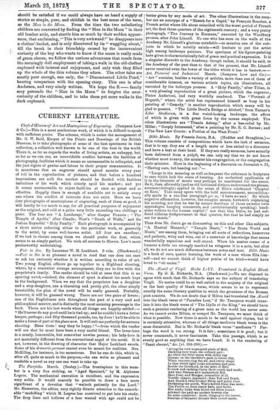Bible Music. By Francis Jacox, B.A. (Hodder and Stoughton.)— This
volume consists of compositions which have the look of sermons, that is to say, they are of a length more or less suited to a discourse and have a text at their head. If they are really sermons, have aotually been delivered from a pulpit, we can only Bay that we do not know whether most to envy, the minister his congregation, or the congregation their minister. Here is the beginning of a discourse on Jeremiah v. 21, "Having ears, but hearing not :"— " Large is the meaning as well as frequent the reference in Scripture to ears which lack the sense of hearing. An misthetical application of it in the interests of music may perhaps be sanctioned for the nonce. Be it, then, allowably (and as old-fashioned divines understand the phrase, accommodatingly) applied in the sense of Elites celebrated Chapter on Ears.' That essay opens with the bold announcement, uncondition- ally made in a one-line paragraph per se, I have no ears.' By which negative affirmation, however, the essayist means, forthwith explaining his meaning, not that he was by nature destitute of those exterior twin appendages, hanging ornaments, and (architecturally speaking) hand- some volutes to the human capital ;" nor that, like Defoe, he had suf- fered hideous disfigurement in that quarter, but that he had simply no ear for music."
Thus does Mr. Tacos go on discoursing on this and other like subjects. "A Musical Monarch," "Temple Music," "The Brute World and Music," are among them, bringing oat all sorts of reflections, humorous and pathetic, witty and wise, out of a reservoir of knowledge that seems wonderfully capacious and well stored. When his matter seems of a humour a little too strongly marked he relegates it to a note, but after all, we do not see much difference between notes and text. Bible Music is a book of rare, quaint learning, the work of a man whom Elia him- self—and we cannot think of higher praise of its kind—would have loved to "sit under."


































 Previous page
Previous page